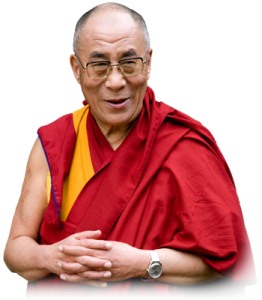His Holiness the 14th Dalai Lama, Tenzin Gyatso (short for Jetsun Jamphel Ngawang Lobsang Yeshe Tenzin Gyatso), “is both the head of state and the spiritual leader of Tibet.” For decades he has been among the most recognizable advocates of peace, and was awarded the Nobel Peace Prize for his continued non-violent efforts aimed at the liberation of Tibet. Additionally, His Holiness has received nearly a hundred formal awards or honors for his “message of peace, non-violence, inter-religious understanding, universal responsibility and compassion.” He has spread his message through speeches to audiences throughout the world, and by authoring over 70 books. Notably, “His Holiness describes himself as a simple Buddhist monk.”
Book Basics
Recognizing the inability of any single religion or religious tradition to speak to or for all people in the current age of globalization, religious pluralism, and multiculturalism, the Dalai Lama proposes a secular basis for universal ethics. This new perspective is built upon two pillars: (1) “recognition of our shared humanity and our shared aspiration to happiness and the avoidance of suffering” and (2) “the understanding of interdependence as a key feature of human reality” (p. 19). With considerable attention to advances in the scientific understanding of what it means to be human and the social nature of humanity, he constructs a new vision of mutuality that focuses on compassion. This way forward is the same for all, but must be lived into as individuals. As such, those who are religious can find helpful guidance from within their respective traditions for ethical living within the underlying secular framework. To ensure readers do not perceive his construct as theoretical, the Dalai Lama leverages the second half of the book to share helpful tools for those interested in adopting this perspective. While drawing heavily from his own Buddhist tradition, he carefully articulates universal applicability.
So What?
The Dalai Lama envisions compassion as essential and as something that each person must work to develop:
Compassion means wanting to do something to relieve the hardship of others, and this desire to help, far from dragging us further into suffering ourselves, actually gives us energy and a sense of purpose and direction . . . However, since universal compassion involves gradually expanding one’s circle of concern until it finally embraces the whole of humanity, it needs constant cultivation (p.55).
Additionally, he clarifies that while compassion is involved with non-violent care and advocacy for the other it also is actively engaged in addressing injustice:
Nothing in the principle of compassion – the wish to see others relieved of suffering – involves surrendering to the misdeeds of others. Nor does compassion demand that we meekly accept injustice. Far from promoting weakness or passivity, compassion requires great fortitude and strength of character . . . nonviolence is not a sign of weakness, but rather of self-confidence and courage (p.57-58).
Questions to Ponder
- Do you believe a secular basis for universal ethics is reasonable? achievable? Why or why not?
- How can your religious tradition’s ideals build upon a broader understanding of compassion that is desirable for all of humanity?
Tenzin Gyatso (His Holiness the 14th Dalai Lama). Beyond Religion: Ethics for a Whole World (Houghton Mifflin Harcourt, 2011). ISBN: 9780547636351.
